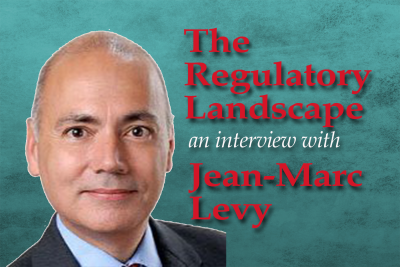
 Maurice Gilbert, CCI Publisher and Managing Partner of Conselium Executive Search, interviews Jean-Marc Levy, President, Ethics & Compliance Solutions for LRN, a leading provider of tools, education and strategic advice that help organizations navigate complex legal and regulatory environments and meet their compliance obligations.
Maurice Gilbert, CCI Publisher and Managing Partner of Conselium Executive Search, interviews Jean-Marc Levy, President, Ethics & Compliance Solutions for LRN, a leading provider of tools, education and strategic advice that help organizations navigate complex legal and regulatory environments and meet their compliance obligations.
Maurice Gilbert: LRN has worked in the ethics and compliance space for the past 20 years. Based on your past experience and knowledge, how do you see the regulatory landscape changing corporate compliance programs in the future?
Jean-Marc Levy: Historically, the regulatory landscape has been greatly influenced by societal trends. The same forces transforming society at large today are what regulators and compliance officers will be addressing tomorrow. To me, the two most meaningful societal trends likely to influence regulators are transparency and interdependency. As we and our work become more transparent and interdependent, the amount of data and interactions created – and the associated opportunities for risk – are growing exponentially. This is likely to result in an increasing rate of growth in regulations, oversight and compliance efforts.
At the same time, these forces are bringing truly eye-opening levels of visibility into corporate behavior. The fact that it’s so much easier for regulators to understand what’s happening inside a company likely means that more misbehavior will be exposed, but also means that regulators can now understand and emphasize what actually works in a compliance program, rather than relying on proxy metrics like a reporting structure or a number of course completions. We’re already seeing this in the DOJ’s continued focus on the reach, depth and resonance of a program. So companies that truly build a culture of compliance will be recognized and rewarded, as opposed to those who simply go through the motions.
MG: As a thought leader, LRN espouses the view that E&C is an opportunity to reinvent business and drive long-term principled performance. Can you elaborate on this paradigm?
JML: Again, it’s all about transparency and interdependence. Society is becoming ever more cognizant of the effect we have on one another in life and in business. Today, a nine-year-old girl in Marin County can raise hundreds of thousands of dollars around the world to fight slavery and human trafficking in Nepal. If a bank in Iceland takes risky market positions, the value of homes in Greece might collapse and spread financial contagion through the rest of Europe.
This transparency and interdependency makes trust the ultimate currency. A purchasing public aware of its choices and informed about the behavior of business is quick to gravitate to purveyors of trust. As we’ve seen, the current generation are very quick to make brand association decisions based upon their belief in the integrity or social value of a company’s behavior.
As the fulcrum of ethics and values in a company, E&C professionals are in an incredibly powerful position to impact the fundamental relationship between the organization and its customers/stakeholders. If E&C professionals succeed in fostering an internal culture of doing the right thing, long-term rewards inevitably follow.
MG: LRN was honored as Winner of 2014 Corporate Organizational Excellence Award and LRN’s CEO Dov Seidman was quoted saying, “We have been on a journey at LRN to become a company governed by a deep sense of shared values and mission, rather than by imposed rules and policies.” How does LRN share this vision with clients so they can share in the same success?
JML: We are very transparent about the challenges and successes we’ve encountered on our own journey, and are always willing to share our takeaways and experiences. At LRN, we have a number of colleagues whose sole focus is capitalizing on this experience, and on the deep set of data collected through our research on hundreds of companies. They help companies connect workforces to their organizational values. They specialize in doing deep work with management teams and employees to uncover the differences between an organization’s stated values and the real values at play, often beginning with a proprietary assessment that is based on our collected data. Once they understand the size and location of the issues, they work with internal groups to build “values muscles”, solving real business challenges using the aspirational values and mission of the organization.
MG: Do you feel there are any industries in particular that have put an emphasis on values as part of their compliance framework?
JML: We recently completed a survey of E&C executives at a pharmaceutical conference, and were very encouraged by the results. An overwhelming majority stated that connecting to company values is the most important element of E&C training programs – more than those who chose clarity on legal rules, the PhRMA Code or FDA/DOJ regulations combined. This could certainly be part of the industry’s focus on caring for consumers, but it could also be part of a larger recognition of the power of values across industries. We’re planning to survey more industries soon, and I’m excited to see the results.
MG: What trends have you observed in the compliance profession in the last five years? Where do you see the profession headed?
JML: The most obvious change is that compliance is now considered a true profession. In the long stretch of corporate history, it’s only in the last 30 years or so that the term “compliance professional” came into being, and perhaps only the last 10 since people look at it as a potential career path. Last year, the Wall Street Journal described Compliance Officer as the “hottest job in America”, with lower unemployment and higher salary growth than most others.
As the profession grows, so do the reach and the requirements of the position. In addition to being at least part lawyer and part educator, compliance officers now are also part psychologist, HR manager, PR professional and corporate strategist. A great E&C program needs to understand the DNA of the company and its long-term business challenges, enlist management from the very top through the middle of their organizations, and develop marketing/communications to ensure messaging effectiveness and coherence. Inevitably, people who master this highly complex system will be greatly sought after, and likely take on senior leadership roles in their organizations.
MG: Recently, many E&C professionals are focusing on reaching middle managers to enhance ‘tone in the middle.’ Do you think this is important? If so, what can companies do to set the appropriate tone among middle managers and employees?
JML: Focusing on tone in the middle is just a proxy for making sure the message gets through. One of the findings from LRN’s How Report is that senior management often believes things at their organization are significantly better than what the rest of the workforce thinks. So even if top management thinks that the company is completely on-board with emphasizing ethics, compliance and values, nothing will change if those messages aren’t being mirrored by middle management. The reason why these middle managers are so important is that they are the tangible representation of “the company” to the majority of employees. Over 80% of ethics complaints are made to a frontline manager, not to an anonymous hotline. This means middle-managers are the first responders on a vast majority of individual ethical challenges facing their business.
MG: What do you see as being the leading attributes of an effective CECO?
JML: I would say that the three most important characteristics of an effective CECO are courage, a deep understanding of the business, and emotional intelligence. The CECO is often the person who has to point out that, in the words of Peter Drucker, “leadership is more about doing the right thing” than just “doing things right.” In traditional corporations, this can be incredibly difficult. So courage is key. Second, as I noted earlier, E&C is finally being recognized as a business and value-driving function. They need to be as intimate with the business or with the strategic levers of their business as their senior counterparts in charge of sales or corporate strategy. Finally, the ability to win hearts and minds, to inspire, is critical. Ethics is fundamentally about good and bad, about being on a mission to do the right thing. That isn’t something that can be accomplished through spreadsheets or negotiation or grudging acceptance. Rallying people around an idea, inspiring their moral imagination takes true connection and emotional leadership
MG: Compliance departments are often asked to accomplish their work with limited resources. Do you see this situation changing any time soon?
JML: There will be ups and downs. The overall trend is probably towards greater resources, because the stakes keep getting higher, the issues more complex, and the impact of getting it wrong demonstrably bigger and more visible. Of course, as E&C professionals become more integral and valued in the organization, their views on the value of the function will carry greater weight. But the day-to-day program managers, who may feel like their scope and responsibilities keep expanding while the resourcing doesn’t keep pace, still need support and data from companies such as LRN to help make the case for the ROI of a really effective compliance program.
MG: What new product or service offerings does LRN have in the queue?
JML: We have a number of initiatives underway. In May we will be releasing the second annual Program Effectiveness Index, which has garnered a lot of attention for statistically identifying, for the first time, the elements that are common to the very best and most effective E&C programs. We recently released over 20 new and updated courses, all of which are mobile-ready and a number of which are games; we’re continuing this year with more courses, more games, more mobile playability, all of which feature the latest instructional design tools and strategies. Our best-in-class Catalyst learning management system and a number of our program management tools are being enhanced to provide more analytics and insights into E&C programs. Finally, our Advisory Services team is helping leading companies develop values-based, multi-screen code-of-conduct solutions for optimal engagement and impact. 2015 is going to be a big year for us and for our partners.
About Jean-Marc Levy
Jean-Marc Levy is President, Ethics & Compliance Solutions for LRN, a leading provider of tools, education and strategic advice that help organizations navigate complex legal and regulatory environments and meet their compliance obligations.
Prior to joining LRN, Jean-Marc served as Senior Vice President and Head of Global Issuer Services for Intercontinental Exchange | NYSE and oversaw NYSE Governance Services, a provider of corporate governance, risk, and ethics and compliance tools and services, to boards of directors and governance and compliance professionals. He also oversaw NYSE’s corporate services business, a portfolio of value-added services for investor relations, IPO, and capital markets professionals.
Jean-Marc has also held senior leadership roles at information and financial services organizations including the Thomson Corporation and Moody’s Investors Service. He was a co-founder of Rudder Capital, a boutique advisory services firm serving the information and financial services industries.
Jean-Marc has served on several advisory and private company boards, has taught graduate level courses on M&A and Strategy, and is a judge in the Wharton School’s annual Business Plan Competition. Jean-Marc holds a B.S. in Computer Science from Tulane University and an M.B.A. from Wharton.
Published by Conselium Executive Search, the global leader in compliance search.

